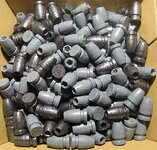Silver Supporter
Bronze Supporter
- Messages
- 1,689
- Reactions
- 622
millions of cast bulllets are shot yearly,and luckiloy for me and others who shoot them there are lots and lots of sellers. For my money you can't beat Badman bullets in Oregon, free delivery on 1k,less than 12cent per bullet in .45 caliber.
..you said you're bullets werent selling,imho they need to be in the 12-15 cent range to sell fast, I pay that for new cast and/or coated bullets from several suppliers.
..you said you're bullets werent selling,imho they need to be in the 12-15 cent range to sell fast, I pay that for new cast and/or coated bullets from several suppliers.


















